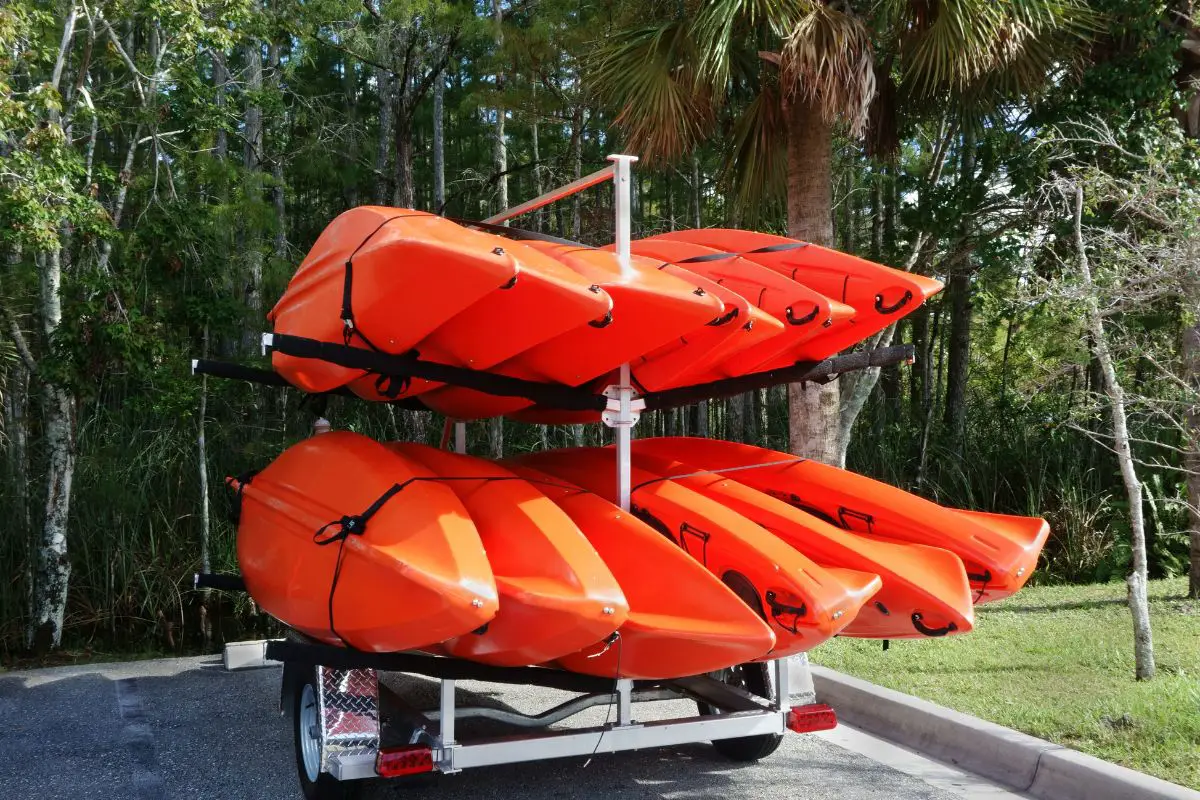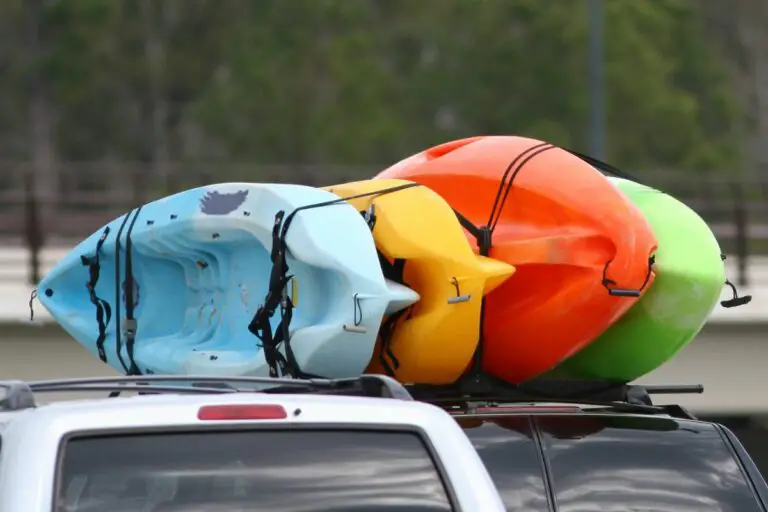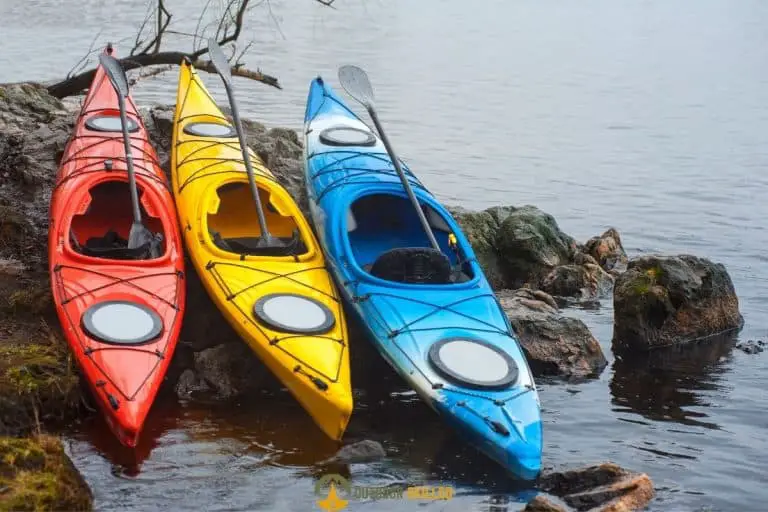Do Kayak Trailers Need to Be Registered? Guide for All States
Transporting kayaks to and from the water can be a challenge, especially if you don’t have a suitable vehicle. That’s where kayak trailers come in – these specially designed trailers make it easy to transport kayaks, canoes, and other small boats.
But if you’re thinking about buying a kayak trailer, you may be wondering if it needs to be registered. So, do kayak trailers need to be registered?
Kayak trailers do not need to be registered as long as they are not above a certain weight limit and are not used for commercial purposes. However, it’s best to check with your local Department of Motor Vehicles (DMV) to confirm specific regulations in your area.
Keep reading to learn more about what it means to register a kayak trailer, the states where it’s required, and how to go through the process.
Table of Contents
What Kind of Trailers Are Used for Kayaks?
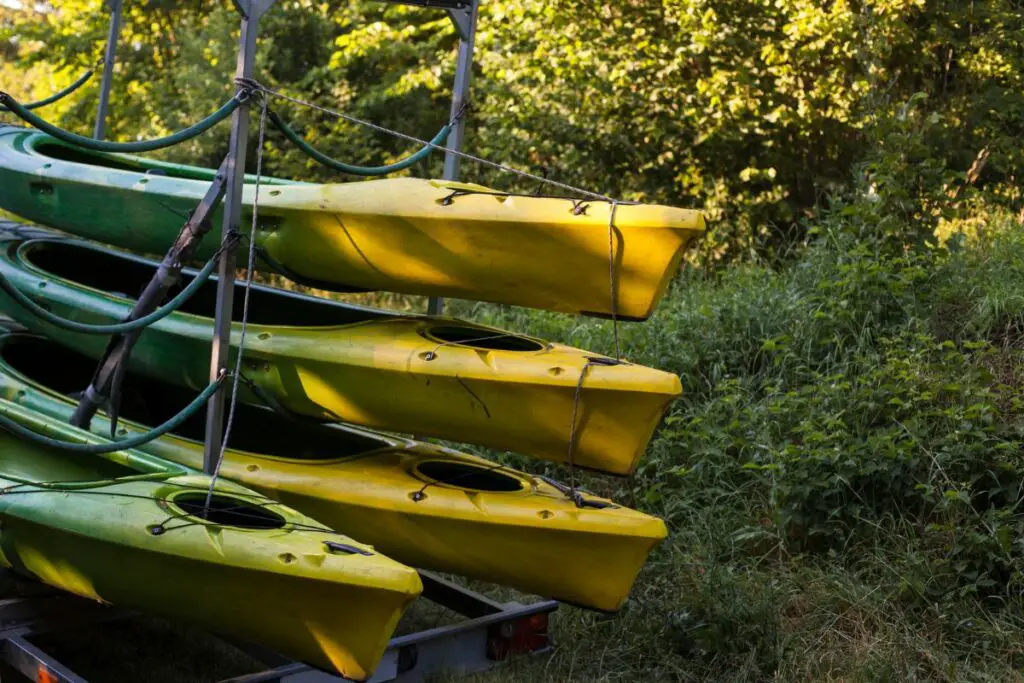
There are different types of trailers that can be used for kayaks, including dedicated kayak trailers, multi-sport trailers, and utility trailers.
- Dedicated kayak trailers are specifically designed for transporting kayaks and can accommodate multiple boats.
- Multi-sport trailers can transport a variety of outdoor equipment, including kayaks, bikes, and camping gear.
- Utility trailers can also be used to transport kayaks but may require additional modifications or equipment to secure the boats properly.
Do Kayak Trailers Need to Be Registered?
The registration requirements for kayak trailers vary by state, but in general, trailers above a certain weight limit and used for commercial purposes need to be registered. In some states, any trailer that is towed on public roads needs to be registered, regardless of weight or usage.
It’s important to check with your local Department of Motor Vehicles (DMV) to determine the specific regulations in your area. Even if your kayak trailer doesn’t need to be registered, you may still need to comply with certain safety requirements, such as having reflectors or tie-down straps to secure your kayaks during transport.
What Does It Mean to Register A Kayak Trailer?
Registering a kayak trailer typically involves obtaining a license plate and paying registration fees to the state’s Department of Motor Vehicles (DMV). The registration process also includes meeting certain safety standards, such as having functioning lights, brakes, and other equipment required by the state.
The purpose of registering a kayak trailer is to ensure that it meets the necessary safety standards for use on public roads and to hold the owner responsible for any violations.
In addition to registering your kayak trailer, you will need to register the kayak itself, and you can learn all about it in my guide about registering motorized kayaks here.
Difference Between Titling and Registration
Titling and registration are two separate processes related to vehicle ownership.
Titling refers to the legal documentation that establishes ownership of a vehicle, similar to a deed for a house or a title for a piece of land. So, when you purchase a new kayak trailer, you’ll receive a title that proves you’re the owner of the trailer.
Registration, on the other hand, refers to the process of obtaining a license plate, paying registration fees, and meeting certain safety standards.
In summary, titling establishes ownership, while registration ensures that the vehicle meets safety standards and is legally allowed to be operated on public roads.
States That Require Kayak Trailer Registration
The registration requirements for kayak trailers or boat trailers vary by state. So, here’s a breakdown of the registration requirements for all states:
| State | Trailer Registration Requirement |
| Alabama | No registration is required. |
| Alaska | All trailers require registration. |
| Arizona | Trailer registrations depend on usage criteria and the weight of the trailer. |
| Arkansas | All trailers require registration. |
| California | A PTI program registration program is used for all trailers except trailer coaches and park trailers. |
| Colorado | All trailers require a title and registration. |
| Connecticut | All trailers require a title and registration. |
| Delaware | Boat trailers require a title and registration. |
| Florida | Boat trailers require registration. |
| Georgia | Boat trailers require registration. |
| Hawaii | Boat trailers require registration. |
| Idaho | Boat trailers require a title and registration. |
| Illinois | Boat trailers require registration. |
| Indiana | Boat trailers require registration. |
| Iowa | All trailers require registration. |
| Kansas | Boat trailers require registration if their gross weight is 2,001 pounds or more. |
| Kentucky | No registration requirement for privately owned trailers used for the transportation of personal effects, boats, or farm products and equipment. However, all trailers require a title. |
| Louisiana | Boat trailers require registration. |
| Maine | Boat trailers require registration. |
| Maryland | All trailers require a title and registration. |
| Massachusetts | All trailers require a title and registration. However, if the operating weight is 3,000 pounds or less, a title is not required. |
| Michigan | All trailers require registration. |
| Minnesota | Utility trailers with a gross weight of 3,000 pounds or less require registration, but no license plate is required. If the registered trailer weighs over 3,000 pounds, a license plate will be required. |
| Mississippi | Boat trailers require a title and registration if their gross weight is over 5,000 pounds. However, a title is not required if it weighs less than 5,000 pounds. |
| Missouri | Boat trailers require a title and registration. |
| Montana | Boat trailers require a title and registration. |
| Nebraska | All trailers require registration. |
| Nevada | Boat trailers require registration. |
| New Hampshire | Boat trailers require registration. |
| New Jersey | All trailers require a title and registration. However, if the gross weight is 2,500 pounds or less, a title is not required. |
| New Mexico | Boat trailers require registration. |
| New York | Boat trailers require registration. |
| North Carolina | All trailers require registration. |
| North Dakota | No registration requirement for boat trailers. |
| Ohio | Boat trailers require registration. |
| Oklahoma | No registration requirement for boat trailers. However, noncommercial trailers, such as utility and boat trailers, can be registered (no title required) if the owner wants. |
| Oregon | All trailers require a title and registration if the gross weight is over 1,800 pounds. |
| Pennsylvania | Boat trailers require a title and registration. |
| Rhode Island | Boat trailers require registration. |
| South Carolina | All trailers require a title and registration if the gross weight is over 2,500 pounds. |
| South Dakota | No registration requirement for privately owned boat trailers. |
| Tennessee | No registration requirement for boat trailers. |
| Texas | Boat trailers require a title and registration if their gross weight is over 4,000 pounds. However, a title is not required if it weighs less than 4,000 pounds. |
| Utah | All trailers require a title and registration if the gross weight is over 750 pounds. |
| Vermont | Boat trailers require registration. |
| Virginia | All trailers require registration. |
| Washington | Boat trailers require registration. However, you can have “intermittent use” license plates if the trailer weighs under 2,000 pounds (while empty). |
| West Virginia | Boat trailers require registration. |
| Wisconsin | All trailers require a title and registration if the gross weight is over 3,000 pounds. |
| Wyoming | Boat trailers require registration. |
It’s important to note that the registration requirements may change over time, so it’s best to check with your local DMV for the most up-to-date information.
When to Register Your Kayak Trailer?
You should register your kayak trailer as soon as possible after purchasing it and before using it on public roads if required by your state’s DMV.
In some states, kayak trailers must be registered immediately upon purchase, while in others, you may have a certain number of days or weeks to register the trailer.
So, it’s important to check with your local DMV to determine the specific registration requirements and deadlines for your state.
How to Register Your Kayak Trailer?
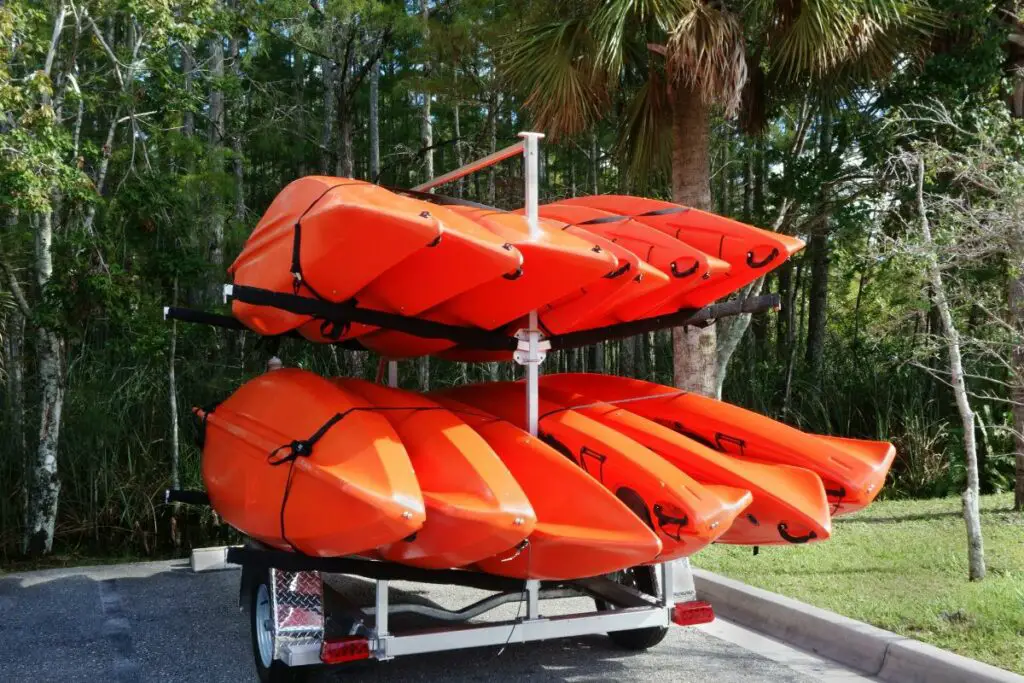
The process for registering your kayak trailer will depend on the specific requirements of your state’s Department of Motor Vehicles (DMV). In general, the following steps may be required:
- Obtain a title: If you recently purchased your kayak trailer, you’ll need to obtain a title that proves you’re the legal owner of the trailer. You may be able to obtain this from the seller or by applying for a title through your state’s DMV.
- Complete the registration application: You’ll need to complete a registration application form, which may be available online or at your local DMV office.
- Provide proof of ownership: You’ll need to provide proof of ownership, such as the title or bill of sale for your kayak trailer.
- Pay registration fees: You’ll need to pay a registration fee, which will vary depending on your state and the weight of your trailer. Some states may also require payment of sales tax.
- Pass a safety inspection: Some states may require a safety inspection to ensure that your kayak trailer meets certain safety standards, such as having functioning lights and brakes.
- Obtain license plates: Once your registration is complete, you’ll receive license plates that must be displayed on your kayak trailer when using them on public roads.
Remember, you need to check with your local DMV to determine the specific requirements for registering your kayak trailer in your state, as the process may vary.
What Information Do You Need to Register A Kayak Trailer?
The information required to register a kayak trailer may vary by state and DMV but typically includes the following:
- Trailer identification: You’ll need to provide the make, model, year, and vehicle identification number (VIN) of your kayak trailer. This information is typically located on the trailer itself or on the title.
- Proof of ownership: You’ll need to provide proof that you own the kayak trailer, such as a title, bill of sale, or registration from the previous owner.
- Trailer weight: You’ll need to know the weight of your kayak trailer, which can usually be found on the manufacturer’s label or on the title.
- Insurance information: Some states may require proof of insurance for your kayak trailer.
- Safety inspection: Some states may require a safety inspection before registering your kayak trailer.
Make sure to check with your local DMV to determine the specific information and documentation required to register your kayak trailer in your state.
How Much Does It Cost to Register A Kayak Trailer?
In general, registration fees range from around $10 to $50 or more. The cost may vary depending on the state you live in and the weight of your trailer.
Some states may also require payment of sales tax at the time of registration. In addition to registration fees, you may also need to pay for a safety inspection or obtain insurance for your kayak trailer, which could add to the overall cost.
How Long Does Trailer Registration Last, And How to Renew It?
The length of time that trailer registration lasts will vary by state. In general, registration for kayak trailers typically lasts one to two years. Some states may require annual renewals, while others may offer longer registration periods or permanent registration.
To renew your kayak trailer registration, you’ll need to follow a similar process as when you initially registered the trailer. This typically involves submitting a renewal application, providing proof of ownership, paying the renewal fees, and passing any required safety inspections.
The renewal process may also include updating your contact information or insurance information if necessary.
Note that failure to renew your kayak trailer registration on time may result in late fees or penalties, as well as potential legal consequences if you’re caught using an unregistered trailer on public roads.
Kayak your way to Freedom
- On a budget? Check out the best fishing kayaks under $500 here and the best Fishing Kayaks under $1,000 here. Or Check the best Cheap Kayaks here.
- Going fishing? Here are the best Ocean fishing kayaks, and here are the best River Fishing Kayaks.
- You can also find the best Fly Fishing Kayaks here and the best Bass Fishing Boats here.
- A bit experienced? Check out the best modular kayaks here and the best tandem fishing kayaks here.
- Looking for something special? Check out my favorite Ducky kayaks here.
- Navigate your way with these awesome and beginner-friendly Kayak compasses.
- Going Hunting? These Duck hunting kayaks will give you an unfair advantage!
- Have a need for speed? These motorized kayaks will get you moving.
- Protect yourself from the sun with these Kayak shades, and make your kayak more comfortable with these Kayak seats.
- Keep your feet dry and warm with these superb Kayaking shoes.
- Going Kayaking in cold water? Stay warm with these Kayaking gloves.
- Paddle Less, Fish More with the Best Kayak Motors
- Looking to get a trolling motor on your kayak? Check out the best kayak trolling motor mounts here.
If you like this article, please share it or pin it, you can find the share buttons below. We will really appreciate it ❤️

